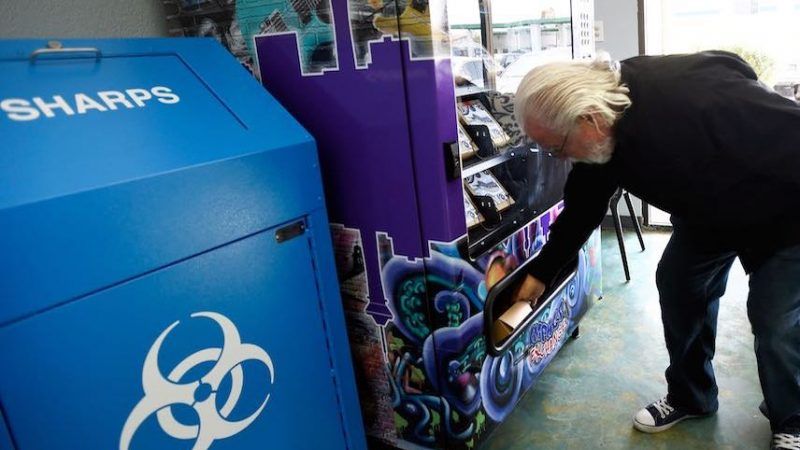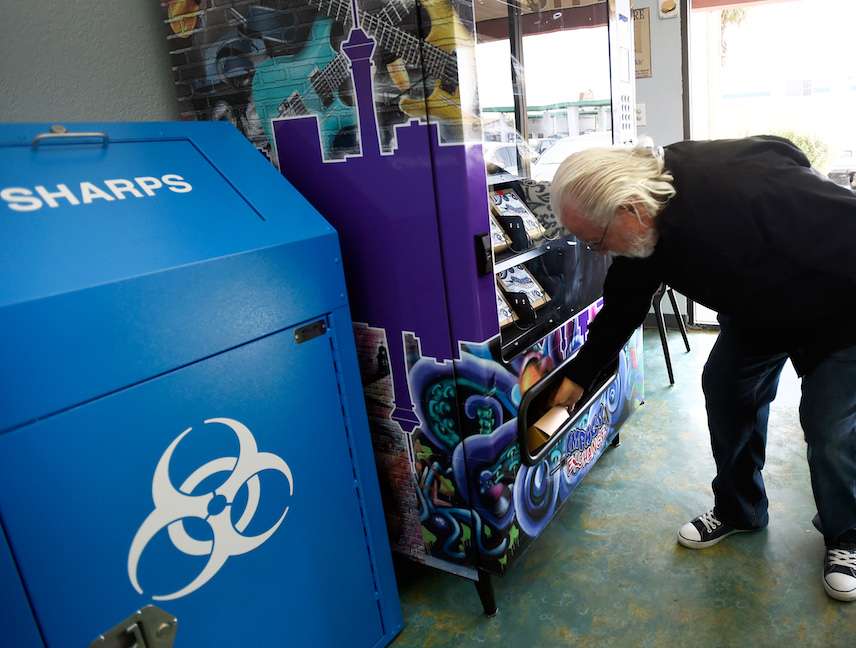In Wake of New HIV Cases, Northern Kentucky Public Health Officials Call for More Clean Needle Exchanges
Harm reduction advocates urge Kentucky counties to act before an epidemic occurs.


Public health officials in Kentucky are sounding the alarm about a brewing HIV problem in the northern part of the state, including a threefold increase in the number of people who may have contracted the virus via intravenous drug use. The Northern Kentucky Health Department (NKHD) identified 37 new cases of HIV in the region, compared to 25 in 2016 and 34 in 2015.
"These numbers are concerning to us because they may be an indication of more widespread HIV infections in our community," the NKHD's Lynne M. Saddler said in a statement released today. The department will now ask the Centers for Disease Control and Prevention (CDC) to test samples from newly identified HIV patients in order to assess whether they've all been infected with the same strain.
In the meantime, public health officials are calling for more counties to create clean needle exchange programs to curb the spread of HIV and hepatitis C.
"We know that access to clean injection equipment is a proven measure to reduce the spread of HIV and other infectious diseases among individuals who inject drugs," says a statement from Garren Colvin, CEO of the St. Elizabeth Healthcare network of Catholic hospitals. "For the last several years, St. Elizabeth and the Health Department have advocated for syringe access exchange programs in our region. Now more than ever, we need to move from advocacy to action, and encourage local officials to act quickly to allow for such programs to operate."
The Kentucky legislature legalized clean needle exchanges in 2015, but the decision to open them is ultimately made at the county level. The state now has 39 exchanges, and advocates want to see more in order to avoid the kind of epidemic-level outbreak experienced by southern Indiana.
"The lesson from the Scott County, Indiana, HIV outbreak is twofold," says Daniel Raymond, deputy director of planning and policy for the Harm Reduction Coalition. "HIV transmission can rapidly spread among people who inject drugs when you don't have good syringe access, but prompt and decisive action by policymakers and health officials can successfully contain an outbreak. Times of crisis can cut through political debates, but smart policy can prevent a crisis from coming to a head."
According to the Kentucky Cabinet for Health and Family Services, Kentucky has one of the highest rates of hepatitis C in the U.S.—a "canary in the coal mine for an HIV outbreak." Of the 220 U.S. counties thought to be vulnerable to an HIV outbreak like southern Indiana's, the CDC estimates that 54 are in Kentucky.
"Our best tool for stopping further HIV transmission is syringe exchange," Raymond says. "Without immediate action to scale up syringe exchange programs, more people who inject drugs will get HIV."
Editor's Note: As of February 29, 2024, commenting privileges on reason.com posts are limited to Reason Plus subscribers. Past commenters are grandfathered in for a temporary period. Subscribe here to preserve your ability to comment. Your Reason Plus subscription also gives you an ad-free version of reason.com, along with full access to the digital edition and archives of Reason magazine. We request that comments be civil and on-topic. We do not moderate or assume any responsibility for comments, which are owned by the readers who post them. Comments do not represent the views of reason.com or Reason Foundation. We reserve the right to delete any comment and ban commenters for any reason at any time. Comments may only be edited within 5 minutes of posting. Report abuses.
Please to post comments


As always: is there something preventing people from buying their own? Or from charities to buy in bulk and distribute them?
Thinking people should buy their own clean needles is exactly the same as thinking people shouldn't be allowed to have clean needles at all. Didn't you learn anything from the last 8 years of healthcare debates?
Reason doesn't even discuss this, which is what confuses me the most. It says its up to the county to decide, why is that? Why no push to just let anyone buy and give away needles? Or is that okay now and doesn't work for some reason?
Damn, that was a lot of semi-rhetorical questions.
Why is it confusing? Allowing iIV drug users to just buy hypodermics and safely dispose of them on their own doesn't create one public health job. You can't parley the opioid crisis into a wide-open tap on the public treasury with your ridiculous proposal to permit people to buy and use dangerous medical devices without close professional supervision.
Or is that okay now and doesn't work for some reason?
Not surprisingly, folks that use recreational intravenous drugs don't always make the best decisions regarding their health.
So yeah. If you don't make it easy for them to safely do dangerous drugs, they tend not to.
Or to put it another way... sure, if everyone was responsible and made good decisions, we wouldn't need needle exchanges. But they aren't, and we do.
And so Churches and other groups just don't do it because? There are charities for everything. There's probably a charity to fund teaching kids to wipe their ass right, but no one willing to distribute needles?
Let alone that it's a federal regulation that stops people from just boiling them.
a "canary in the coal mine for an HIV outbreak."
That's unfortunate phrasing, in Kentucky.
Yeah, I believe they call them Hollers down there.
Not in Northern Kentucky. They're more likely to call them Whole Fooders.
HFS is just rubbing it in. Coal Mine Canary used to be a well-paid career in Kentucky, and you could learn the trade from your pappy like he learnt it from his pappy, down unto the generations. But now all them jobs is gone, like Aunt Mommy's leg below the knee on account of the 'beetus. [stares wistfully at treeless landscape of removed mountaintops and slurry ponds]
In the northern part of the state? I'm no expert on Kentucky, but my sister used to live in northern Kentucky and it was essentially a suburb of Cincinnati. It was a bunch of clean-cut affluent white folks who were particularly un Southern.
I remember you had to drive quite a ways south before Kentucky became more like The Stereotype of Kentucky.
Clean cut white people love heroin. It is a genetic tendency they have to love narcotics.
I'm just a little surprised is all. It's a bit like saying that there's a major HIV breakout due to Shared needles in Bellevue Washington
Don't act like you don't know that all the white people in Washington are strung out on heroin because of grunge music and seasonal depression.
I wonder if they mean Louisville area myself. That's on the northern border of Kentucky, and that would put it right next to the southern Indiana hotbed that the article keeps mentioning. Even if that's not what I would think of as northern Kentucky, it's technically on the northern border so that might be the confusion.
That said, I can't walk from one high priced mall to the other high priced mall in Bellevue without seeing two Expedia CEOs fighting each other for the last few traces of heroin.
I'm sure there's a perfectly reasonable explanation. It just seems weird to me. If they'd have said there was a major HIV outbreak in Kentucky, full-stop, I wouldn't have thought anything of it. But the article specifically calls out northern Kentucky. If I were expecting a major outbreak due to Shared needles viis-vis the opioid crisis, Northern Kentucky wouldnt be place I think would get called out.
"The Northern Kentucky Health Department (NKHD) identified 37 new cases of HIV in the region, compared to 25 in 2016 and 34 in 2015."
I don't see why this is the government's business. They should allow needle sales, but to encourage people to provide them? Nope.
I believe somebody in a previous thread pointed out and even provided a link to an Amazon store that sells hypodermic needles by the hundreds for super cheap
How does this logic not apply to sex workers?
How would you like to see it apply to sex workers?
Some sort of sex-worker exchange: bring in your used prostitute and collect a clean one?
Or just "legalize at the state level and leave local authorites make a local decision"?
If it's the former, probably because of slavery. If it's the latter, that's exactly what Nevada does, and a step in the right direction according to make advocates for sex-workers.
Too many words. I just want free to me sex workers.
... and thank you for the thoughtful reply. You make good points...
But won't this encourage drug use and people getting high? What kind of message does this send to the children?
Time to move out of that rut into a new one. For many years, libertarians rode the drug reform bandwagon with needle exchange programs, because they were the only viable path when syringes were prescription-only items. Now that almost all (maybe all by now,I keep forgetting) states have repealed their prescription requirement, gov't support of needle exchange is no longer something we need to be behind; in fact we should be against it!
Hello everyone I felt this might be of help to someone out there, I amBETTY DONNIEfrom Texas USA, my mom was diagnosed of stage 2 cancer in 2012 but she is free from the disease now. I was introduced by a close friend to Dr MARK a herbal doctor who treated my mom with herbal cure for a period of time. We have done test several times and have been told the cancer is gone. This same Dr MARK also cured me from herpes simplex which I was suffering from for years now. All thanks to him add him email: (markherbs1960 @ gmail. com)(+2 3 4 8 1 4 3 1 4 6 4 1 3)whatapp number
I read that the man is so powerful he had cured different types of diseases, Like
DIABETICS
HERPES
INFERTILITY
LUPUS VIRUS
CANCER and so on...
HIV
contact him on email
(markherbs1960 @gmail. com)whatapp + 2 3 4 8 1 4 3 1 4 6 4 1 3